Substitute for Sugar in Beef Bulgogi
Beef Bulgogi to rival any Korean restaurant is easy to cook at home!
Beef Bulgogi is crazy tender and juicy seeping with mildly sweet, savory, smoky flavors from the soy, sesame, garlic, ginger marinade. It is intensely flavorful, and tantalizingly delicious. This Bulgogi cooks super fast, so once your steak is done marinating, it's 15 minutes to dinner!
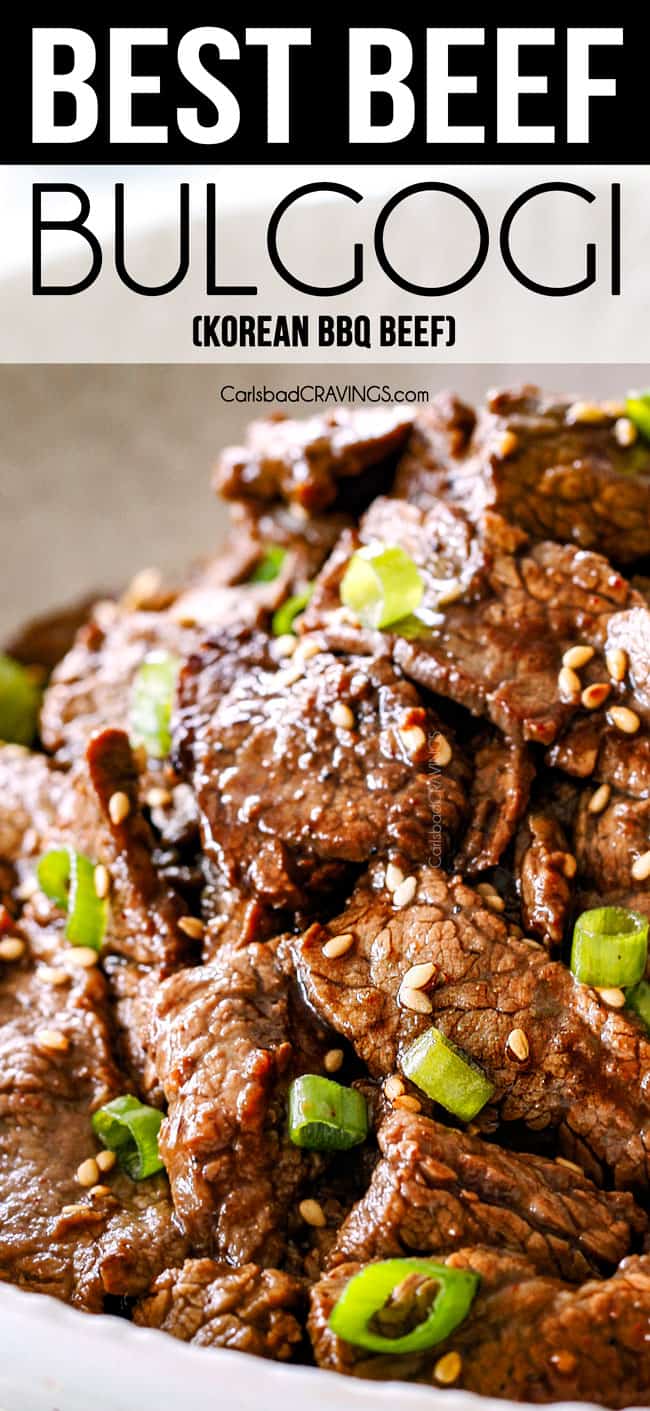
Beef Bulgogi (Korean Beef BBQ) is one of the most popular Korean dishes. And soon you will taste why. Bulgogi can be barbecued on top of a charcoal grill (in which case you will want a fine mesh sieve) or pan-fried. I've chosen the pan-fried version for this recipe for convenience and ease – as in soooo easy! You may never want to eat any other Bulgogi again!
What is Bulgogi?
Beef Bulgogi is one of the most popular Korean dishes. It is tender, thinly sliced, caramelized beef usually rib eye, but I have had great success with flank steak as well. The marinated beef is slightly sweet, savory and characteristically seasoned with soy sauce, ginger, garlic, sesame and scallions as well as a freshly grated ripe pear to tenderize the meat.
Bulgogi literally means "fire" and "meat" and is traditionally grilled on a barbecue or on a stove-top griddle. Modern interpretations, however, often cook Bulgogi in a screaming hot cast iron or stainless steal skillet so the edges caramelize like they would on a grill.
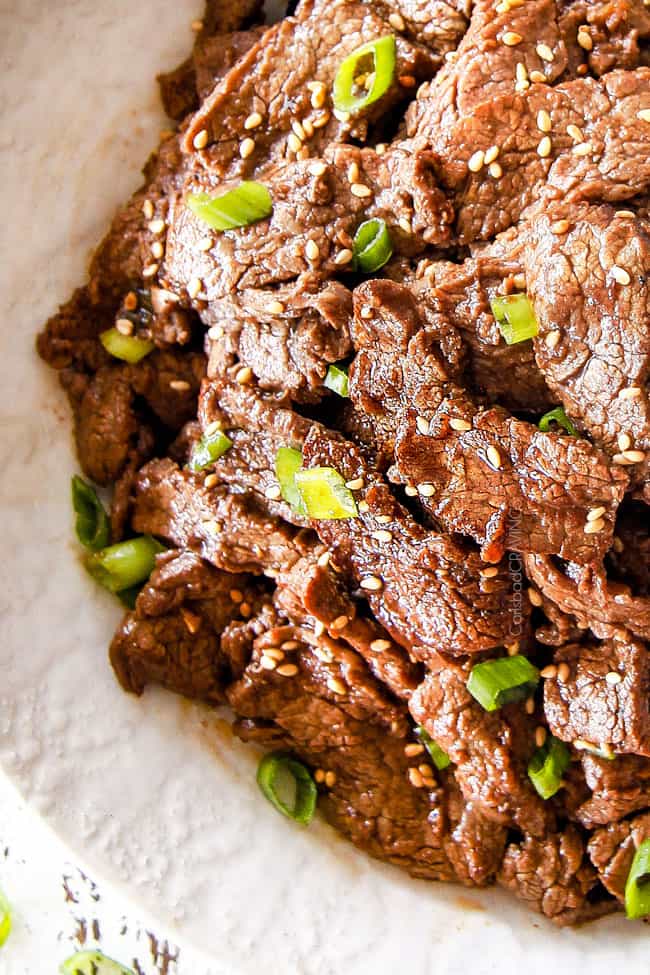
What kind of meat do you use for beef bulgogi?
Bulgogi is typically made with almost paper-thin slices of the most tender cuts of beef. Rib-eye is the most common cut of beef with top sirloin coming in a close second.
That being said, I have used both rib-eye and flank steak for this Beef Bulgogi recipe and honestly, I could barely tell a difference! So, if you are looking for a more economical way to make Bulgogi, I highly suggest either flank steak or skirt steak and then marinate for a few hours to ensure your beef is melt-in-your-mouth-tender.
WHAT IS BULGOGI SAUCE MADE OF?
Bulgogi sauce is intensely flavorful and irresistible. It is a soy based marinade/sauce flavored with ginger, garlic, sesame and Asian pear (more on pear below). Brown sugar is added for sweetness as well as sweet rice cooking wine. I've also added Gochuchang to the Beef Bulgogi marinade for a subtle sweet heat and dimension of flavor.
If you aren't familiar with rice wine – rice wine is NOT rice vinegar- DO NOT switch them out. Rice wine adds a sweetness and depth of flavor while also tenderizing the beef. Rice vinegar, on the other hand will add an acidic flavor. I use "Kikkoman Aji-Mirin: Sweet Cooking Rice Seasoning" which is commonly found in the Asian section of most grocery stores or you can Amazon it. I highly suggest you google image before you head off to the grocery store so you know exactly what you are looking for. The best substitute for rice wine is pale dry sherry.
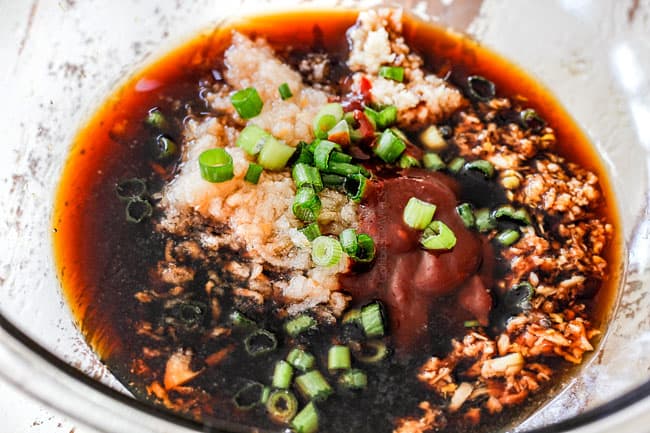
WHAT IS GOCHUJANG AND WHERE CAN I BUY IT?
Gochujang is a Korean BBQ Sauce that's the perfect blend of savory, sweet and spicy and one of my absolute favorite Asian condiments. By adding it to the marinade, the resulting beef Bulgogi isn't spicy at all, by our standards, but boasts fabulous dynamic flavors.
If you don't want to purchase Gochujang just for this recipe, then I suggest adding 1-3 teaspoons of an alternative Asian hot chili sauce. However, I also use Gochujang in my Korean BBQ Burgers, Korean Meatballs, Korean Beef Stir Fry and Korean Beef Bowls, so it is fabulous to have on hand and won't go to waste!
I use Annie Chun's Sweet and Spicy Gochujang Sauce located in the Asian section of my grocery store, but you can also easily buy it on Amazon. I do recommend looking to see what Annie Chun's Gochujang Sauce looks like so you can easily spot it at the grocery store (not an affiliate, just will make your life easier).
Asian Pear and Asian Pear Substitutes
The Korean/Asian pear is round and pale yellow. Essentially, it looks like a yellow-ish apple. To me, it tastes like a cross between an apple and a pear and is one of my favorite fruits! It is sweet and juicy with the firm texture of an apple.
We grate ¼ of an Asian pear and add it to the marinade. The grated pear not only adds sweetness but more importantly, tenderizes the meat as well.
Asian pears are more readily available in the fall and winter months (sometimes even Costco carries them), but I easily found mine at Sprouts in July! So if you aren't sure if your store carries them, just ask! If you can't find Asian pears, you can substitute a sweet apple like Fuji or Bosc pear.
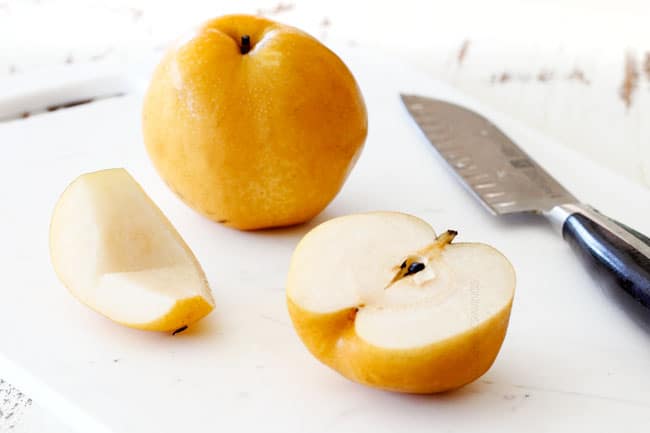
Is Bulgogi spicy?
Although Bulgogi means "fire meat," it is not spicy. The literal translation in reference to the cooking style of being fried in a skillet or tabletop grill. Beef Bulgogi is more on the sweet side, even with the addition of Gochujang.
You can certainly make your beef spicier by adding additional Gochujang or Asian hot chili sauce.
How Long to do you marinate Bulgogi?
If you choose to use flank steak or skirt steak, I suggest marinating the beef longer because these are tougher meats to start with. I would marinate flanks and skirt steak for at least 2 hours but overnight is best.
If you are using rib-eye or top sirloin, you can get away with marinating for as little as a 30-minutes at room temperature, but 2-3 hours in the refrigerator is optimal. The meat is sliced so thinly and it's already so tender so you don't need much more than 3 hours, but you are welcome to marinate longer.
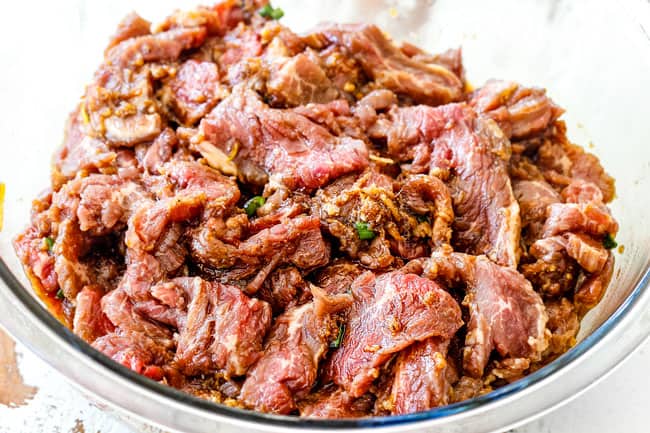
Helpful Tips to make Easy Beef Bulgogi
- Freeze beef. You can purchase pre-sliced Beef Bulgogi meat at Korean grocery stores, otherwise, the easiest way to thinly slice beef is while it is partially frozen. Wrap beef in plastic wrap and freeze 1-2 hours until it is firm enough to hold shape but still soft enough to slice. I like to cut the beef in half and place one half in the freezer until I am finished slicing the first half so it doesn't start to defrost on the cutting board.
- Cut beef thin. Slices should be less super thin – even more thin than the beef in Beef and Broccoli or Spicy Korean Noodles. Beef Should be sliced less than 1/8" thick if cooking in a skillet and 1/8" thick if cooking on the grill. Don't worry if the edges look a bit ragged.
- Cut beef across the grain. You can see the "grain" running through the meat in one direction. The grain is essentially the muscle fibers running through the meat. You want to cut perpendicular to the muscle fibers so they become as short as possible as opposed to long muscle fibers. Long muscle fibers will give you chewy, rubbery tough meat – so cut AGAINST the grain.
- Butcher's help. You can ask your butcher to slice the meat thinly for you!
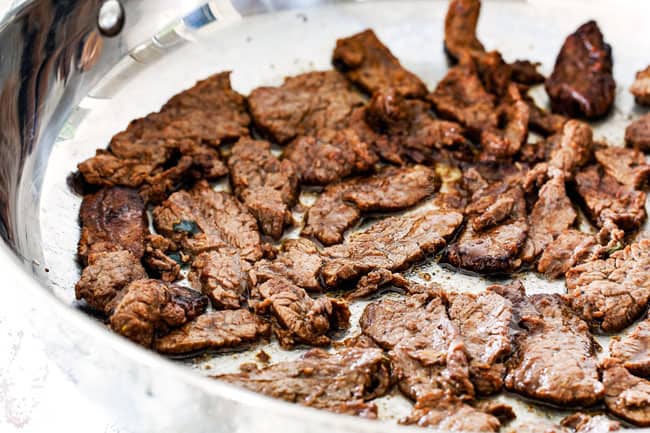
- Beef Substitutes. You can mix up the meat in this Bulgogi and use boneless pork loin, boneless short rib, skinless, boneless chicken breasts or thighs.
- Bring meat to room temperature. Let beef sit at room temperature for 30 minutes. This way your beef won't be cold when it touches the hot skillet and immediately reduce the skillet temperature. Chilled meat also will releases more of its juices, which we don't want.
- Use tongs. We don't want excess moisture/marinade in our skillet in order for the beef to sear and caramelize instead of just steam, so use a pair of tongs to transfer your beef from the marinade to the skillet, letting excess marinade drip off. If there is excess moisture left in your skillet after you cook you first batch, wipe it out with a paper towel.
- Use a hot skillet. Your pan should be hot enough so that the meat sizzles as soon as it touches the pan. We want the outside of our meat to develop a nice sear while the inside remains tender, this ensures juicy steak. To do this, use a wok, cast iron or stainless steal pan, make sure your skillet is nice and hot.
- Don't overcrowd your pan. Cook your steak in 4 batches so you don't overcrowd your skillet which will steam instead of sear your beef. The hot skillet will evaporate any extra moisture as it sears the meat and leave you with beautifully caramelized Beef Bulgogi. It only takes a few minutes to cook each batch, so please do not try to rush the process and crowd your pan or your beef will suffer flavor and tenderness.
- Add additional sugar to taste. Beef Bulgogi is mildly sweet, but just how sweet is subjective. I think the recipe is perfect as written, but you can add more sugar while you're cooking if you like sweeter Bulgogi. To do this add sprinkle ½-1 teaspoon brown sugar over your meat then stir fry.
WHAT SIDE DISHES TO SERVE WITH BULGOGI?
Bulgogi is commonly served with rice and kimchi. It is also served as a wrap. To make a wrap, use whole, fluffy lettuce leave such as green leaf or romaine and add any of the following: rice, hot peppers, carrots, cucumbers, bean paste.
Bulgogi can also be easily turned into a Beef Bulgogi stir fry by adding any of your favorite veggies. I recommend stir frying your veggies separately after the beef so they don't overcrowd the pan and release excess moisture with the beef. Bulgogi can also be turned into delectable Korean Tacos. I serve mine with Asian Pear Mango Slaw and they are divine!
LOOKING FOR MORE ASIAN RECIPES?
- Beef and Broccoli
- General Tso's Chicken
- Mongolian Chicken
- Cashew Chicken
- Pineapple Ginger Chicken
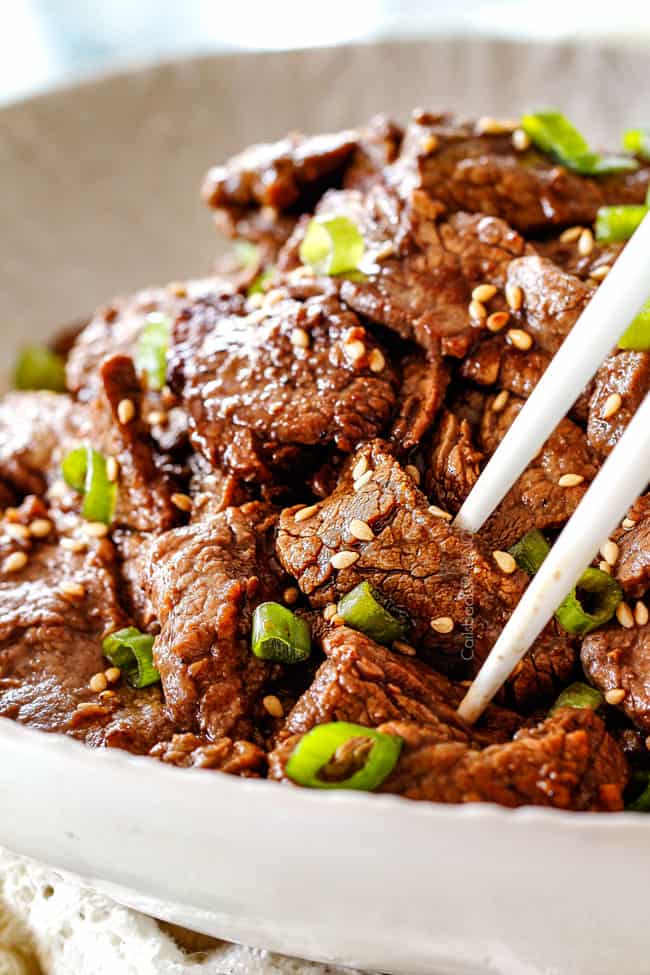
WANT TO TRY THIS BULGOGI RECIPE?
PIN IT TO YOUR ASIAN, BEEF OR DINNER BOARD TO SAVE FOR LATER!
FIND ME ON PINTEREST FOR MORE GREAT RECIPES! I AM ALWAYS PINNING :)!
©Carlsbad Cravings by CarlsbadCravings.com
Try this Beef Bulgogi in my new Korean Tacos!
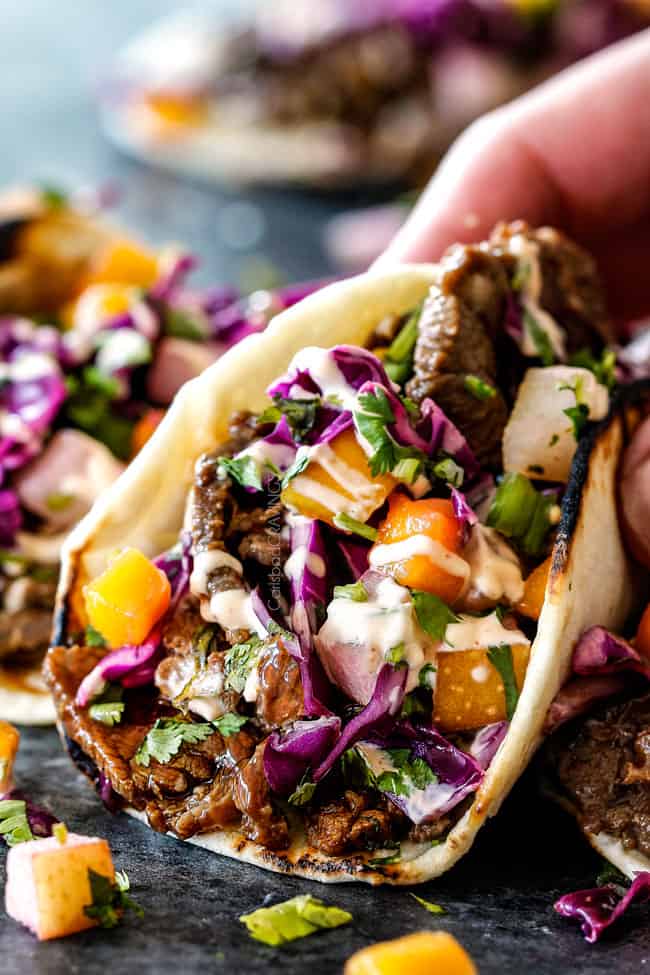
Save This Recipe To Your Recipe Box
You can now create an account on our site and save your favorite recipes all in one place!
- 1 1/2 pounds rib eye, top sirloin or flank steak THINLY sliced across the grain (less than 1/8″)
- Vegetable oil
-
Add all of the marinade ingredients to a shallow bowl or freezer bag (whatever you are going to marinate your steak in) and whisk to combine. Add steak and turn to coat. Cover and marinate 30 minutes at room temperature (only an option if using rib eye or top sirloin) or refrigerate up to overnight.
-
When ready to cook, let beef sit at room temperature for 30 minutes. Heat one tablespoon vegetable oil over medium high heat in a large cast iron skillet, wok or stainless steal pan.
-
Working in 4 batches, add meat (grabbing meat with tongs so excess marinade drips off) in a single layer and let sear 1-2 minutes. Flip and cook and addition 1-2 minutes or until browned but barely cooked through then add sesame seeds and stir to combine. Transfer to a plate and cover tightly with foil. Repeat.
-
Garnish with additional sesame seeds and green onions if desired. Serve with additional Gochuchang if you would like it spicier.
- Korean/Asian pear. Asian pears look like a pale, yellow apple. Asian pears are more readily available in the fall and winter months (sometimes even Costco carries them), but I easily found mine at Sprouts in July! So if you aren't sure if your store carries them, just ask!
- Asian pear Substitute. If you can't find Asian pears, you can substitute a sweet apple like Fuji or Bosc pear.
- Rice wine is NOT rice vinegar– DO NOT switch them out. I use "Kikkoman Aji-Mirin: Sweet Cooking Rice Seasoning" which is commonly found in the Asian section of most grocery stores or you can Amazon it. I highly suggest you google image before you head off to the grocery store so you know exactly what you are looking for. The best substitute for rice wine is pale dry sherry.
- Gochuchang is a sweet and spicy Korean Barbecue Sauce and is one of my favorite condiments. I use Annie Chun's Sweet and Spicy Gochujang Sauce located in the Asian section of my grocery store, but you can also easily buy it on Amazon. I do recommend looking to see what Annie Chun's Gochujang Sauce looks like so you can easily spot it at the grocery store (not an affiliate, just will make your life easier). If you don't want to purchase Gochuchang just for this recipe, then I suggest adding an 1-3 teaspoons of an alternative Asian hot chili sauce.
- Freeze beef. You can purchase pre-sliced Beef Bulgogi meat at Korean grocery stores, otherwise, the easiest way to thinly slice beef is while it is partially frozen. Wrap beef in plastic wrap and freeze 1-2 hours until it is firm enough to hold shape but still soft enough to slice. I like to cut the beef in half and place one half in the freezer until I am finished slicing the first half.
- Cut beef across the grain. You can see the "grain" running through the meat in one direction. The grain is essentially the muscle fibers running through the meat. You want to cut perpendicular to the muscle fibers so they become as short as possible as opposed to long muscle fibers. Long muscle fibers will give you chewy, rubbery tough meat – so cut AGAINST the grain.
- Butcher's help. You can ask your butcher to slice the meat thinly for you!
- Beef Substitutes. You can mix up the meat in this Bulgogi and use boneless pork loin, boneless short rib, skinless, boneless chicken breasts or thighs.
- Marinating Times. If you choose to use flank steak or skirt steak, I suggest marinating the beef longer because these are tougher meats to start with. I would marinate flanks and skirt steak for at least 2 hours but overnight is best. If you are using rib-eye or top sirloin, you can get away with marinating for as little as a 30-minutes at room temperature, but 1-2 hours in the refrigerator is optimal. The meat is sliced so thinly and these cuts of meat are already so tender you don't need much more than 3 hours, but you are welcome to marinate longer.
- Use tongs. We don't want excess moisture/marinade in our skillet in order for the beef to sear and caramelize instead of just steam, so use a pair of tongs to transfer your beef from the marinade to the skillet, letting excess marinade drip off. If there is excess moisture left in your skillet after you cook you first batch, wipe it out with a paper towel.
- Use a hot skillet. Your pan should be hot enough so that the meat sizzles as soon as it touches the pan. We want the outside of our meat to develop a nice sear while the inside remains tender, this ensures juicy steak. To do this, use a wok, cast iron or stainless steal pan, make sure your skillet is nice and hot.
- Don't overcrowd your pan. Cook your steak in 4 batches so you don't overcrowd your skillet which will steam instead of sear your beef. The hot skillet will evaporate any extra moisture as it sears the meat and leave you with beautifully caramelized Beef Bulgogi. It only takes a few minutes to cook each batch, so please do not try to rush the process and crowd your pan or your beef will suffer flavor and tenderness.
- Add additional sugar to taste. Beef Bulgogi is mildly sweet, but just how sweet is subjective. I think the recipe is perfect as written, but you can add more sugar while you're cooking if you like sweeter Bulgogi. To do this add sprinkle ½-1 teaspoon brown sugar over your meat then stir fry.

Did You Make This Recipe?
Tag @CarlsbadCravings and Use #CarlsbadCravngs
Leave a Review, I Always Love Hearing From You!
©Carlsbad Cravings Original
brandonburborpoes.blogspot.com
Source: https://carlsbadcravings.com/beef-bulgogi/
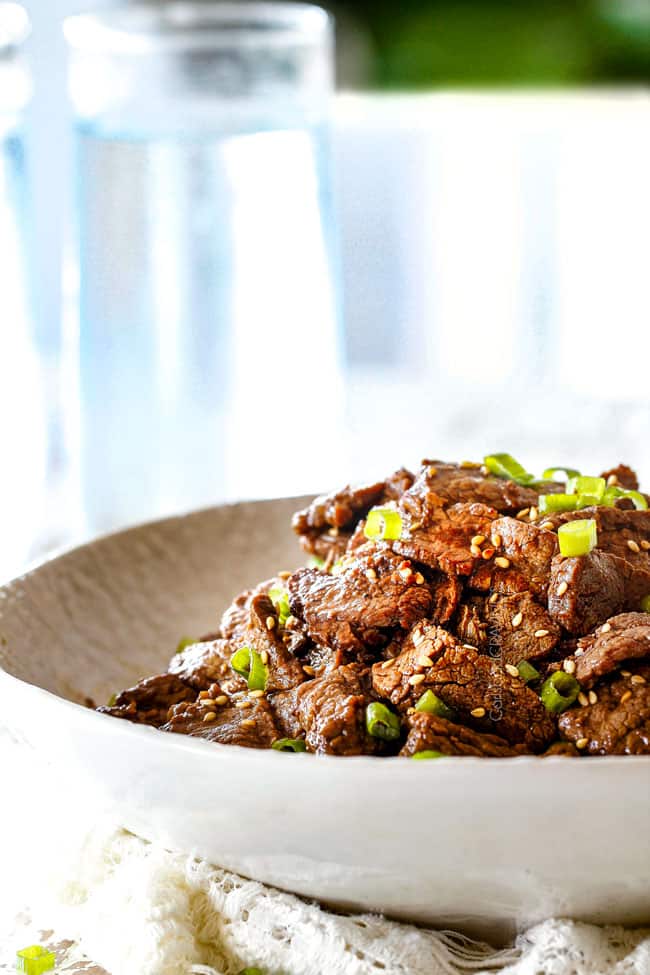
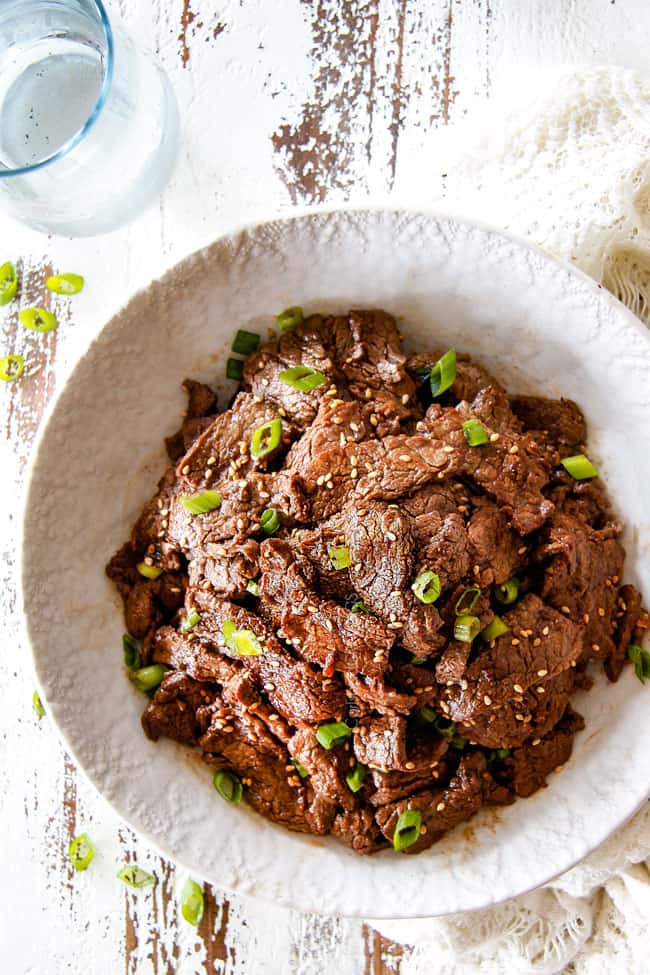
0 Response to "Substitute for Sugar in Beef Bulgogi"
Post a Comment